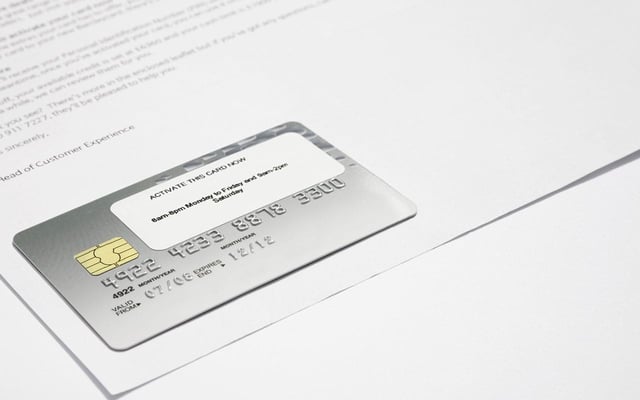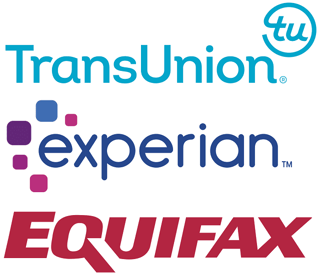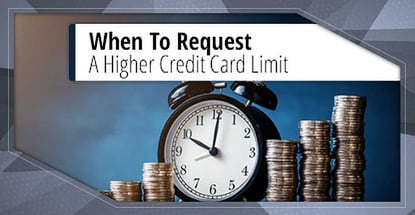There are plenty of reasons to request a higher limit for one or more of your credit cards. With a higher limit, you might be able to:
• Charge bigger purchases
• Be better prepared for financial emergencies
• Earn more card rewards
• Boost your credit scores
• Get lower rates/fees for a new mortgage or car loan
Sure, those are all great perks of being able to access more credit but how do you know when to request a higher credit limit?
Asking for a higher limit is easy, but it comes with certain risks. If you ask at the wrong time, you could actually hurt your credit scores and not get the higher limit you want. To avoid those bad outcomes, think about why you want a higher limit, position yourself to get it, and ask at the right time for your card company to say yes.
What is a Card Credit Limit?
A card credit limit is the maximum amount you can charge with a specific card. If you try to charge more than your limit, your transaction could be declined, you could be charged a penalty fee or your credit scores could take a hit.

Your credit limit represents the full dollar amount available to you for spending on purchases and/or balance transfers. Your credit limit is disclosed to you upon approval and appears on each monthly credit card statement.
Card limits range from a few hundred dollars to $10,000 or more. Some luxury cards offer very high limits of $30,000, $50,000 or even $100,000. How high your limit will be when you first get a card depends on a variety of factors. Your card company may consider:
• Your credit scores
• Your payment history
• How much of your available credit you use
• Your monthly income and expenses
• How long you’ve used credit
• How long you’ve been employed
• Whether you’ve recently applied for new credit
You’ll typically be given a higher limit if:
• You have good or excellent credit scores
• You pay your bills on time
• You don’t max out your available credit
A lower limit might be appropriate if:
• You’re a student
• You don’t have much experience using credit
• You’ve had trouble paying your bills on time
• Your credit scores are fair or poor
“Opening a credit card is like starting a new relationship: You have to build trust,” says Discover. “Your first limit is your issuer extending you a small amount of trust. If you establish a good payment history — i.e., build trust — they may be more comfortable increasing your credit limit in the future.”
If you don’t know the limits on your cards, check your monthly statements. Your limit for each card should be disclosed there.
When You Should Ask for a Higher Limit
The best time to ask for a higher card limit is when you’re managing your finances well and you feel confident that you can handle a higher limit. You may be ready if:
• Your credit scores are good or excellent
• You have a history of using your card regularly, making your payment on time, and not maxing out your current limit
• You recently got a raise, a new job with higher pay or are otherwise boosting your income
• You recently graduated from college and expect to earn more income
Keep in mind that your card company wants to raise your limit when you can spend more, not when you’re in trouble financially.
When You Shouldn’t Ask for a Higher Limit
Just as there are times when you should ask for a higher limit, there are also times when you shouldn’t. You may not be ready if:
• Your credit scores are fair or poor
• You’ve made multiple late payments
• You’ve maxed out your current limit
• You took a pay cut, lost your job, got a different job that pays less or abandoned a side gig
• You stopped working full time

Each credit bureau must supply you one copy of your credit report annually.
If you’re uncertain about your credit, you can get free copies of your Equifax, Experian, and TransUnion credit reports from AnnualCreditReport.com. Your reports won’t show your credit scores, but they should give you a good idea of whether your credit is in good shape or not. If you find errors in your reports, you can ask the credit bureaus to correct them, which could improve your scores.
If you’re confident that your card company will say yes, it may be a good time for you to ask for the higher limit you want. To make your request, contact your card company by phone or online.
Higher Limit Perks and Pitfalls
A higher limit might sound great, but it comes with both perks and pitfalls. It allows you to charge more, but a higher limit could entice you to charge more than you can afford. It could raise your credit scores if you use a lower proportion of the credit you have available, or it could lower your scores if your card company does a hard credit check to evaluate your request.
Perks:
- You can charge more with a card you already have.
- Your credit scores might improve if you utilize a lower percentage of your available credit.
Pitfalls:
- You might be tempted to overspend.
- Your credit scores might worsen if your card issuer does a hard pull to decide whether to raise your limit.
If you ask for a higher limit, don’t expect a huge bump. More likely, you’ll be offered an extra 10% or 25% of your current limit.
How Asking for a Higher Limit Could Affect Your Credit Score
Asking for a higher limit could affect your credit score in two ways:
1. Your request could trigger a hard credit check, which happens when you actively seek out more credit. Multiple hard checks within a short time can hurt your scores more than just one hard check.
“For most people, a single hard credit inquiry could knock anywhere from 1 to 5 points off your credit score, and that number could be higher for those with a short credit history or those with multiple hard inquiries close together,” says TheMotleyFool.com.
If you don’t want to risk a small hit to your scores, you could wait and see whether your card company will raise your limit without your asking. Card companies typically reassess limits from time to time and raise or lower them for their existing customers.
2. A higher limit could change your credit utilization rate, which is the percentage of your available credit that you use. For example, if you had a card with a $2,000 limit and a $1,000 balance, your utilization rate for that account would be 50%. Your overall utilization rate includes your credit cards and other revolving debt, but doesn’t include loans that have a set repayment period, Experian explains.
Your credit utilization rate — sometimes called “Amounts Owed” — typically accounts for about 30% of your score.
If your limit goes up and your spending stays the same, your utilization rate will be lower. If your limit goes up and your spending also goes up, your utilization rate might be higher, lower, or the same.
“Generally speaking, the higher your utilization rate is, the greater the risk that you will default on a credit account within the next two years,” says MyFICO.com.
6 High-Limit Credit Cards To Consider
If you’re looking for a higher limit, but it’s not a good time for you to approach your card company, another option is to apply for a new card. Since some cards have higher average limits than others, you can shop for a new card with that feature.
These eight cards come with some of the highest limits in their categories:
The Chase Sapphire Preferred® Card offers top-tier benefits and a popular rewards program. The average limit is reportedly around $10,000 with about 10% of cardholders having a $20,000 limit and a select few being given limits as high as $100,000 or more.
The Capital One Venture Rewards Credit Card features a premium mileage rewards program with no blackout dates. While the average limit for this card may be in the $5,000-to-$10,000 range, limits as high as $30,000 or $50,000 have been reported.
This card is currently not available. Additional Disclosure: The information related to Chase Freedom Flex℠ credit card has been collected by CardRates.com and has not been reviewed or provided by the issuer of this card.3. Chase Freedom Flex℠
The Chase Freedom Flex℠ and Chase Freedom Unlimited® cards offer attractive cash back rewards. Average limits reportedly range from $3,000 to $5,000 at the low end and up to $24,000 at the high end. These cards come with a 0% introductory APR for new purchases.
This card is currently not available. Additional Disclosure: Information for this card not reviewed by or provided by Capital One.5. Capital One Spark Cash for Business
The Capital One Spark Cash for Business is a business-class card that reportedly offers limits up to $30,000. This card comes with a cash back rewards program and signup bonus. There’s no extra charge for employee cards.
The Capital One QuicksilverOne Cash Rewards Credit Card reportedly offers an average limit of around $2,000 and a high-end limit of up to $5,000. Again, that might sound low, but unlike other higher-limit cards, this one is available for people whose credit is only so-so.
Advertiser Disclosure
CardRates.com is a free online resource that offers valuable content and comparison services to users. To keep this resource 100% free, we receive compensation for referrals for many of the offers listed on the site. Along with key review factors, this compensation may impact how and where products appear across CardRates.com (including, for example, the order in which they appear). CardRates.com does not include the entire universe of available offers. Editorial opinions expressed on the site are strictly our own and are not provided, endorsed, or approved by advertisers.


![9 Best No-Limit, High-Limit Prepaid Debit Cards ([updated_month_year]) 9 Best No-Limit, High-Limit Prepaid Debit Cards ([updated_month_year])](https://www.cardrates.com/images/uploads/2021/04/Best-No-Limit_High-Limit-Prepaid-Debit-Cards--1.jpg?width=158&height=120&fit=crop)
![3 Tips: Credit Card Limit Increases Without Asking ([updated_month_year]) 3 Tips: Credit Card Limit Increases Without Asking ([updated_month_year])](https://www.cardrates.com/images/uploads/2019/10/Credit-Limit-Increase-without-Asking-Feat--1.jpg?width=158&height=120&fit=crop)
![7 Best High-Limit Credit Cards for Fair Credit ([updated_month_year]) 7 Best High-Limit Credit Cards for Fair Credit ([updated_month_year])](https://www.cardrates.com/images/uploads/2017/11/fair-credit-limits-art.jpg?width=158&height=120&fit=crop)
![16 High Limit Credit Cards for Excellent Credit ([updated_month_year]) 16 High Limit Credit Cards for Excellent Credit ([updated_month_year])](https://www.cardrates.com/images/uploads/2019/04/highlimitcover.jpg?width=158&height=120&fit=crop)
![$1,000+ Limit Credit Cards For Bad Credit ([updated_month_year]) $1,000+ Limit Credit Cards For Bad Credit ([updated_month_year])](https://www.cardrates.com/images/uploads/2021/05/1000-Limit-Credit-Cards-For-Bad-Credit.jpg?width=158&height=120&fit=crop)
![$2,000 Limit Credit Cards For Fair Credit ([updated_month_year]) $2,000 Limit Credit Cards For Fair Credit ([updated_month_year])](https://www.cardrates.com/images/uploads/2023/05/2000-Limit-Credit-Cards-For-Fair-Credit.jpg?width=158&height=120&fit=crop)
![[card_field card_choice='5854' field_choice='title'] Credit Limit & Pre-Qualifying ([updated_month_year]) [card_field card_choice='5854' field_choice='title'] Credit Limit & Pre-Qualifying ([updated_month_year])](https://www.cardrates.com/images/uploads/2017/10/shutterstock_662150614.jpg?width=158&height=120&fit=crop)
![12 Best Cards by Credit Limit: $1k, $10k, $50k, $100k+ ([updated_month_year]) 12 Best Cards by Credit Limit: $1k, $10k, $50k, $100k+ ([updated_month_year])](https://www.cardrates.com/images/uploads/2021/01/shutterstock_1038702583.jpg?width=158&height=120&fit=crop)